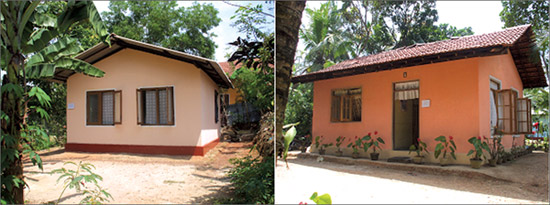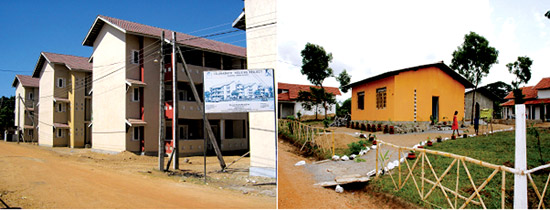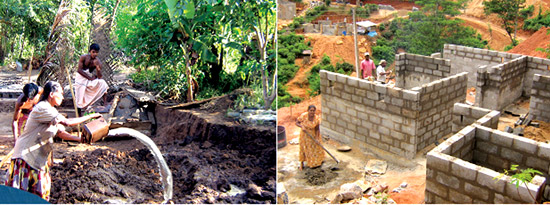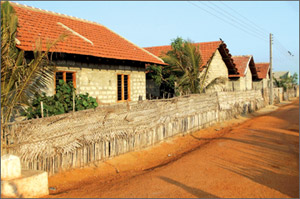|
One million houses to be built in six years:
Lanka's participatory housing plan highlighted at world forum
By L.S. Ananda WEDAARACHCHI
|

Complete houses in Kurunegala
|

Housing schemes in Colombo
A housing scheme |
|

Family participatory housing constructions |
The international community believes that Sri Lanka has made a
serious effort to solve its housing problem participatory community
action plan - a practical solution for housing development introduced by
Sri Lanka was one of the key topics discussed at the United Nations
Habitat sessions, said National Housing Development Authority (NHDA)
General Manager, L.S. Palansuriya.
The Sunday Observer interviewed NHDA GM L.S. Palansuriya on the
NHDA's housing development program extracts of the interview.
Q: Housing is one of the major problems in the South Asian
region. How do you assess the situation in Sri Lanka?
A: According to an NHDA survey Sri lanka needs 1.5 million
houses urgently. The 'Mahinda Chintana' policy framework has provided
for shelter to the homeless. Construction, Engineering Services, Housing
and Common Amenities Minister Wimal Weerawansa aims at completing his
Janasevena one million housing program within a time frame of six years.
All segments of the society - the public and private sectors, higher
income and lower income groups clergy and laymen mobilised to realize
the one million housing target during the past four months.
Q: What is the role of the NHDA?
A: The NHDA which is in the housing development business for
several decades maintains a systematic - network embracing districts and
Divisional Secretary divisions. NHDA has been assigned with the task of
coordinating and implementing housing development projects
Q: You said that the one million housing programme needs to
mobilize all segments of the society. Could you elaborate on it.
A: The government housing policy upto 1984 was to launch
housing projects for the houseless. International and local
organisations and experts on housing development recommended a
participatory approach as more practical in encouraging people to built
their own houses. International awareness on housing was also created in
1980s when Sri Lanka's former President Ranasinghe Premadasa's proposal
to declare a year of shelter was adopted by the United Nations in 1984.
It was implemented by UN in 1987. Under the participatory approach
the government will assist the needy by providing funds and other
auxiliary services.
Q: NHDA implemented a project for Internally Displaced people
IDPs in Mulaitivu and Kilinochchi a few months ago. What is the
progress?
A: The housing project for IDPs was a remarkable success of
the participatory housing approach.
The IDP families released from camps, did not initially agree to
invest their savings to build houses in their own lands as proposed by
the NHDA.

Pallimullai housing scheme in the Northern province |
They called upon the government to provide funds to build houses.
Only two families accepted the NHDA project proposal which grants Rs.
250,000 to house builders to construct houses with other amenities.
Other families too joined the project later.
Q: You attended all sessions of the UN Habitat sessions since
1984. Can you explain what happened at the recent UN Habitat Session
held in Nairobi - Kenya.
A: UN Habitat council is composed of 58 member states
including Sri Lanka. The Sri Lankan delegation led by Construction,
Engineering Services, Housing and Common Amenities Minister Wimal
Weerawansa, his Secretary Gotabhaya Jayaratne Senior Assistant Secretary
Dhammika Wijesingha, NHDA Chairman Jayantha Samaraweera were the members
of the Sri Lankan delegation. In his special presentation Minister Wimal
Weerawansa highlighted the Sri Lankan experience in the current one
million housing programme formation of low-income settlement programme
and low cost housing schemes in rural areas in the Northern Housing
programme.
Q: What was the subjects discussed at the Governing council
session?
A: The council discussed the sustainable urban development
through equitable access to land, housing basic services and
infrastructure.
Habitat session promoted a positive vission under which everyone has
access to land and adequate housing in a safe and healthy environment.
Basic services in which mobility is managed through better urban
planning with public transport provision to avoid urban sprawl were also
taken up for discussion.
Q: Despite improvements in the housing sector slums and in
formal settlements could still be seen in Colombo, Kandy and other
leading towns in Sri lanka. How can we resolve this problem.
A: Rapidly growing cities need to be guided for longer term
sustainability.
A project in this regard is being implemented in Colombo city under
the guidance of Defence Secretary Gotabhaya Rajapaksa.
Thirty percent of the people live in slums and informal settlements
due to inappropriate or inadequate land policy administration and
management.
This percentage is even higher in post-conflict countries. Land
policies need to be developed to facilitate land governance that
enhances gender equality, a flexible land recording system recognition
of the range of land rights, decentralized land management and grass
roots participation, urban equity, efficiency and sustainability. |

